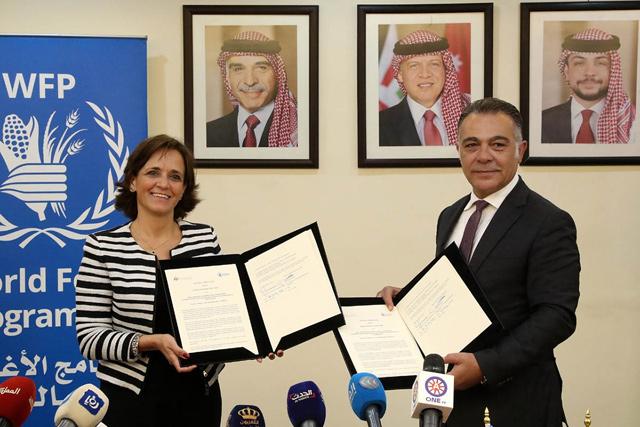- Local News
- Mon-2020-07-27 | 03:49 pm

The agreement, which was signed at the Planning Ministry, was within the framework of the WFP’s Country Strategic Plan for 2020-2022 whereby the WFP will provide humanitarian assistance for existing and future crises, with a focus on supporting refugees, transitioning to resilience building, and supporting the social protection and livelihoods of Jordanians, as well as building the capacity of national institutions.
"The agreement focuses on food safety, especially for around 500,000 refugees and the vulnerable people in our society, especially for the supplying of food for schools,” Rabadi told reporters during a press conference at the ministry.
In addition, the minister said other articles in the agreement emphasise combating unemployment, the empowerment of women and young people and ensuring the enrolment of people with disabilities in the labour market.
Rabadi, who signed the agreement on behalf of the government, called on the international community to "continue their generous support to enable the government to provide a sustainable, strategic and holistic coordination mechanism in response to crises, as well as, ensuring sufficient funding to decrease the current vulnerabilities of Jordanians alongside Syrian refugees in Jordan”.
"The government of Jordan appreciates the WFP $207 million support as part of the Jordanian Response Plan to the Syrian Crisis and we hope the international community will continue their support in the coming years,” the minister said.
The CSP reflects the first step towards a longer-term approach, to enable the Kingdom to realise the goals of its Vision 2025 and achieve Agenda 2030, said Gordon-Gibson.
"I am delighted to sign this agreement because it is a clear indication of WFP’s commitment to working with and supporting the government of Jordan in its path towards a sustainable and resilient country,” Gordon-Gibson added.
This, Gordon-Gibson maintained, means moving from direct implementation, to "supporting and strengthening government and community-based capacities to meet the needs of vulnerable groups and promote social cohesion within communities”.
The WFP is supporting half a million refugees living in camps and communities with monthly cash assistance to meet their food needs, while the school feeding programme provides healthy daily snacks to over 400,000 Jordanian and refugee schoolchildren, according to a WFP press release.
Employment opportunities will be created for around 127,000 vulnerable people through income generating activities to improve their food security, as well as to build community assets that contribute to climate change adaptation and disaster risk reduction, the press release added.
Capacity strengthening activities include supporting the government in reforming and expanding national social protection schemes, enhancing emergency preparedness and response capabilities, and contributing to the food security and nutrition sector, said the press release.









